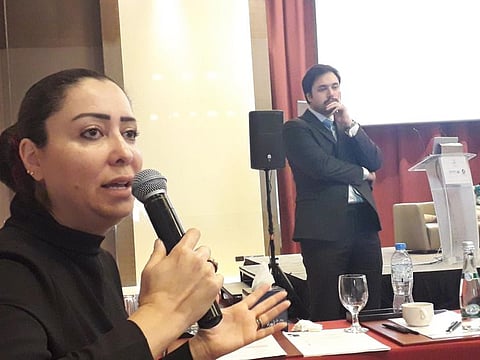Up to Dh500,000 fine for illegal fund raising online
Penalties for cybercrimes include jail up to 10 years, hefty fines

Abu Dhabi: Collecting donations without official permission, sending emails that issue threats or blackmails and posting abuse online can land you in jail for up to 10 years with a hefty fine reaching up to Dh500,000.
As the renewed warning was issued at a conference on the “Prevention of Crime and Extremism: A collective responsibility”, held in the capital this week, Milan Sharif, legal adviser at the Abu Dhabi Police’s General Headquarters, said common practices like raising online funds, swearing, invasion of privacy and blackmail must be guarded against as the country’s laws are stringent when it comes to cybercrimes.
“Many people use social media sites to raise funds under the guise of helping the poor and carrying out humanitarian activities, but they could be actually funding extremist and terror activities,” she said.
With legislations in place to deal with such activities, Sharif said those who misuse public sympathy and kindness to raise money will be firmly dealt with. Article 27 of Federal Law No. 5 of 2012 on Combating Cybercrimes specifically deals with collecting donations online without permission or licence from the concerned authorities.
“A person using a social media site to invite people to raise money for underprivileged people without obtaining official permission can be jailed from one month to three years and penalised with a fine of Dh250,000 to Dh500,000,” she said.
Law against blackmail
Article 16 of the same law states that a person shall be punished by imprisonment for a period of two years at most and a fine of Dh250,000 to Dh500,000 if a computer network or information technology means is used to extort or threaten another person to force him or her to engage in or prevent them from engaging in a certain act.
The imprisonment can go up to 10 years if the intent is to commit a felony or engage in matters against honour or morals.
“If a person sends abusive messages, disrespectful emails to damage the modesty or character of an individual, he or she can be imprisoned for a period ranging from one month to three years, with the fine reaching up to Dh500,000,” the legal advisor said.
Whereas invading privacy of an individual is concerned, posting pictures of a person on WhatsApp, Twitter, Facebook and Instagram and other social media can land the person in jail for six months to three years, with fines ranging from Dh150,000 to Dh500,000, she said.
Even calling a person a thief, rapist or fraudster incurs a jail term of three years with a fine of Dh20,000, Sharif said, adding that in all cases, the penalties are determined by the court depending on the gravity of the crime.
Role of the family in preventing crimes
Families, especially parents, have to play a big role in protecting their children from cybercrimes and guiding them on the right path, Sharif said.
“When children go wrong, parents must guide them. They can seek help from concerned institutions for psychological support. They must stay alert and guard them against committing frauds, thefts, drug and alcohol consumption and such other activities.”
Advanced technology and freedom to access social media platforms without due awareness result in cybercrimes, so families should educate themselves and their children about the underlying dangers of misuse, Sharif added.


